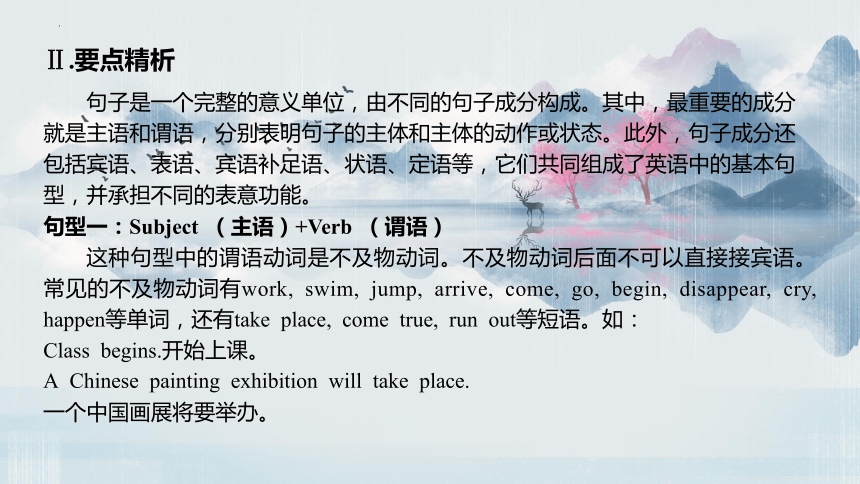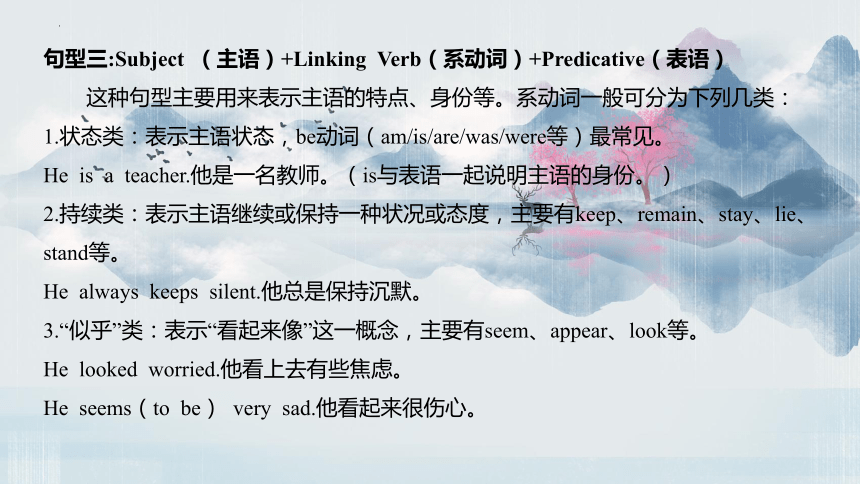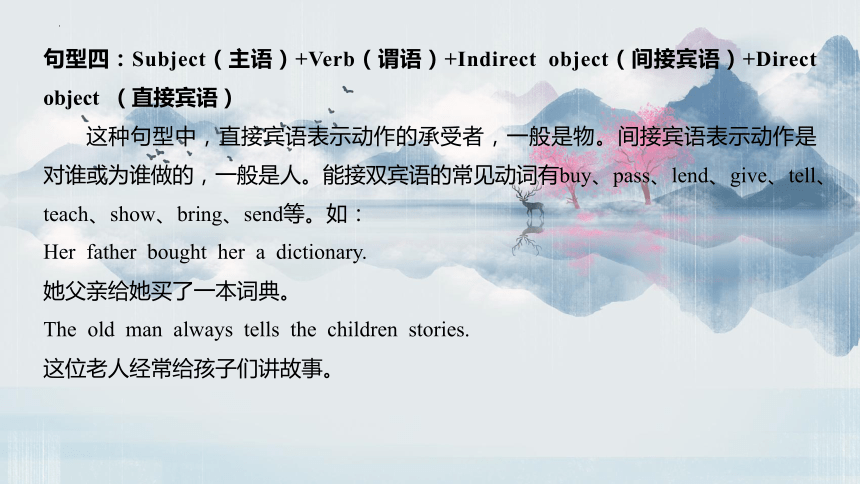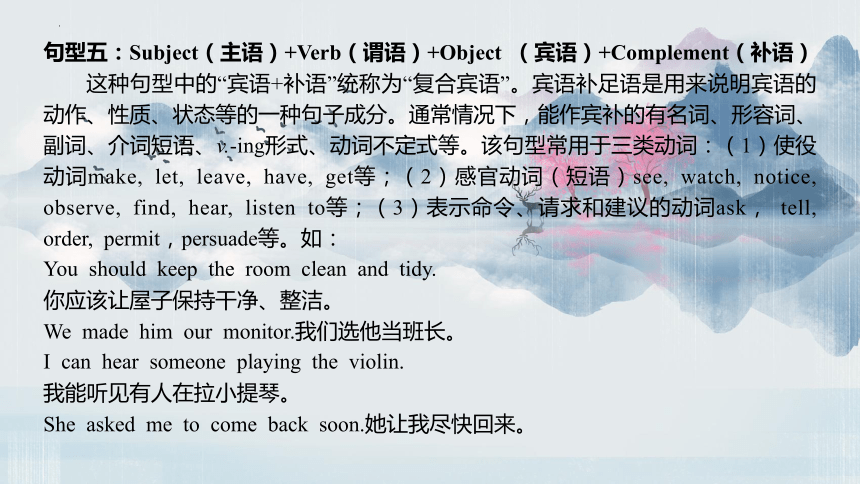外研版(2019)必修第一册Unit 1 A new start Using language 基本句式结构 课件(共35张PPT)
文档属性
| 名称 | 外研版(2019)必修第一册Unit 1 A new start Using language 基本句式结构 课件(共35张PPT) |  | |
| 格式 | pptx | ||
| 文件大小 | 1.0MB | ||
| 资源类型 | 教案 | ||
| 版本资源 | 外研版(2019) | ||
| 科目 | 英语 | ||
| 更新时间 | 2024-07-23 23:25:27 | ||
图片预览












文档简介
(共35张PPT)
Unit 1 A new start
Using language
基本句型
Ⅰ.观察感悟
1.I replied.
2.I saw a white-haired man.
3.I'm Meng Hao.
4.He gave me a smile.
5.His words made me a lot more relaxed!
6.I breathed deeply.
7.I looked at them in panic.
观察上面句子,分别说出每个句子的句子结构。
_______________________________________________________________________
___________________________________________________________________
1.主语+谓语
2.主语+谓语+宾语
3.主语+系动词+表语
4.主语+谓语+间接宾语+直接宾语
5.主语+谓语+宾语+宾补
6.主语+谓语+状语
7.主语+谓语+宾语+状语
Ⅱ.要点精析
句子是一个完整的意义单位,由不同的句子成分构成。其中,最重要的成分就是主语和谓语,分别表明句子的主体和主体的动作或状态。此外,句子成分还包括宾语、表语、宾语补足语、状语、定语等,它们共同组成了英语中的基本句型,并承担不同的表意功能。
句型一:Subject (主语)+Verb (谓语)
这种句型中的谓语动词是不及物动词。不及物动词后面不可以直接接宾语。常见的不及物动词有work, swim, jump, arrive, come, go, begin, disappear, cry, happen等单词,还有take place, come true, run out等短语。如:
Class begins.开始上课。
A Chinese painting exhibition will take place.
一个中国画展将要举办。
句型二:Subject(主语)+Verb (谓语)+Object (宾语)
这种句型中的动词是及物动词或动词短语, 后面要直接接宾语,宾语通常由名词、代词、动词不定式、动名词或从句等来充当。如:
The students have known the answer.
学生们已经知道了答案。
You should not give up studying.
你不应该放弃学习。
I don't know what I should do next.
我不知道下一步该干什么。
句型三:Subject (主语)+Linking Verb(系动词)+Predicative(表语)
这种句型主要用来表示主语的特点、身份等。系动词一般可分为下列几类:
1.状态类:表示主语状态,be动词(am/is/are/was/were等)最常见。
He is a teacher.他是一名教师。(is与表语一起说明主语的身份。)
2.持续类:表示主语继续或保持一种状况或态度,主要有keep、remain、stay、lie、stand等。
He always keeps silent.他总是保持沉默。
3.“似乎”类:表示“看起来像”这一概念,主要有seem、appear、look等。
He looked worried.他看上去有些焦虑。
He seems(to be) very sad.他看起来很伤心。
4.感官类:主要有feel、smell、taste、sound、look等。
This kind of food tastes delicious.
这种食物尝起来很可口。
This kind of cloth feels very soft.
这种布摸起来很软。
5.变化类:表示主语变成什么样,主要有become、grow、turn、fall、get、go、come、run等。
It is getting warmer and warmer.
天气变得越来越暖和。
The skies grew dark.天渐渐黑了。
6.终止类:表示主语已终止动作,主要有prove、turn out等,表达“证实,变成”之意。
The search proved difficult.搜查证实很难。
His plan turned out a success.
他的计划终于成功了。
句型四:Subject(主语)+Verb(谓语)+Indirect object(间接宾语)+Direct object (直接宾语)
这种句型中,直接宾语表示动作的承受者,一般是物。间接宾语表示动作是对谁或为谁做的,一般是人。能接双宾语的常见动词有buy、pass、lend、give、tell、teach、show、bring、send等。如:
Her father bought her a dictionary.
她父亲给她买了一本词典。
The old man always tells the children stories.
这位老人经常给孩子们讲故事。
上述句子还可以表达为:
Her father bought a dictionary for her.
The old man always tells stories to the children.
句型五:Subject(主语)+Verb(谓语)+Object (宾语)+Complement(补语)
这种句型中的“宾语+补语”统称为“复合宾语”。宾语补足语是用来说明宾语的动作、性质、状态等的一种句子成分。通常情况下,能作宾补的有名词、形容词、副词、介词短语、v.-ing形式、动词不定式等。该句型常用于三类动词:(1)使役动词make, let, leave, have, get等;(2)感官动词(短语)see, watch, notice, observe, find, hear, listen to等;(3)表示命令、请求和建议的动词ask, tell, order, permit,persuade等。如:
You should keep the room clean and tidy.
你应该让屋子保持干净、整洁。
We made him our monitor.我们选他当班长。
I can hear someone playing the violin.
我能听见有人在拉小提琴。
She asked me to come back soon.她让我尽快回来。
句型六:Subject(主语)+Verb(谓语)+Adverbial(状语)
这类句型中,谓语动词是不及物动词(短语),后没有宾语,但是有时为了表示动作发生的频率、原因、结果、目的、地点、时间等,可以跟状语性质的修饰语。
The baby is crying in the next room.
婴儿在隔壁房间里哭。
My parents came back at this very moment.
就在这时,我的父母回来了。
句型七:Subject(主语)+Verb(谓语)+Object (宾语)+Adverbial(状语)
这类句型中,副词、介词短语、不定式短语、分词短语等都可以作状语。
You can put the dish here.
你可以把盘子放在这儿。
She was doing her homework at 8:00 last night.
昨晚8点她在做作业。
句型八:存现句(There be...)
There be句型是英语中的常用句型,意思是“有”,表示“人或事物的存在”或“某地有某物”。There be中的be有时可以是lie, stand, used to be, seem to be等。
There is a restaurant around the corner.
拐角处有一家餐馆。
温馨提示
(1)There在此结构中没有实际意义,不可与副词“there那里”混淆。此结构后跟名词,表示“(存在)有某事物”。
(2)be 后面的名词是句子的主语(并非表语),属于倒装结构,在此句型中,be的单复数与最近的名词的单复数保持一致。
Ⅲ.实战演练
写出画线词的句法功能
1. The man ______ his arms above his head. ______
raised
谓语
2. I found a big change ______. ______
there
状语
3. My favourite subject is ________. ______
physics
表语
4. My dream is ___________________________! ______
to start my own IT company
表语
5. I bought ______ a birthday gift. __________
Mary
间接宾语
6. He is watching the players _______________. ____________
playing football
宾语补足语
7. The metal felt ________________. ______
smooth and cold
表语
8. ____ became an English teacher. ______
He
主语
9. There is ___________________________ on the desk. ______
an English-Chinese dictionary
主语
10. The boy's dream __________.______
came true
谓语
用本单元语法知识完成句子
1. 我是个高中生。
I am __________________________.
a senior high school student
2. 我在远离家乡的大城市上学。
I am studying _______________________ far from my hometown.
at a school in a big city
3. 我已经学会了一些新知识。
I have learned ____________________.
some new knowledge
4. 我计划周六回家。
I am planning to go home ____________.
on Saturday
5. 今天我为我的父母买了很多礼物。
I bought my parents ___________________ today.
a lot/lots of presents
将上面的句子连成一篇文章
要求语言流畅、用词准确、逻辑严密。
_______________________________________________________________________
______________________________________________________________________________________________________________________________________________
I am a senior high school student who is studying at a school in a big city far from my hometown. Here I have learned some new knowledge. I am planning to go home on Saturday, so I bought my parents a lot/lots of presents today.
词句精讲·夯实基础
1 argue v.争论,争辩
情境佳句
①Do what you are told and don't argue with me.
照我吩咐你的去做,不要和我争辩。
②The couple begin to argue about money.
这对夫妇开始为钱争吵。
③He argued against working overtime.他反对加班。
归纳拓展
(1)argue with sb.与某人争论/争吵
argue about/over sth.为某事争论/争吵
argue that...主张/认为……
argue for/against(doing) sth.据理力争/反对(做)某事
(2)argument n.争吵;争论;辩论;理由;论据;论点
have an argument(with sb.) about/over sth.因某事(与某人)争吵
学以致用
[单句填空/完成句子]
① They were having an _________ (argue) about whose turn it was to do the
cooking.
argument
② Mary is always ready to argue _____ her parents __________ the smallest
things.
with
about/over
③ 我主张人人都应该尽全力帮助那些需要帮助的人。
____________________________________________ to help those in need.
I argue that every one of us should try our best
2 volunteer n.志愿者,义务工作者 v.自愿做
情境佳句
①Many people volunteer to work on the farm.
很多人主动到农场劳动。
②As one of the volunteers, I have taught English in the mountain village for three years.
作为一名志愿者,我在这个山村教了三年英语。
③We encourage all the students to volunteer for community activities.
我们鼓励所有的学生志愿参加社区活动。
归纳拓展
(1)volunteer to do sth.自愿做某事
volunteer for sth.自愿为某事效劳
(2)voluntary adj.志愿的,自愿的
学以致用
[单句填空/语段填空]
① Whenever we meet with difficulties, she always volunteers ________(help)
us out.
to help
② He always volunteered ____ the most dangerous jobs.
for
③ A group of ___________(volunteer) from universities volunteer ________
(teach) in the mountain middle school. Their _________ (volunteer)work is
very helpful to the students there.
volunteers;
to teach
voluntary
3 apply v.申请,请求,应用
情境佳句
①She applied for a job at the local newspaper.
她申请了当地报社的一个职位。
②It is important to apply what we have learned to practice.
把我们所学的东西应用到实践很重要。
③You will surely pass the exams if you apply yourself to your work.
如果你专心学习,考试一定会及格的。
归纳拓展
(1)apply for/to sth.申请某物
apply to do sth.申请做某事
apply...to...把……应用于……
apply to...适用于……
apply oneself to...致力于……,专心于……
(2)applicant n.申请者
(3)application n.申请;应用
词汇助记
There are more than 300 applications for the job. In other words, more than 300 applicants have applied for the job. 这份工作有三百多人申请。换句话说,300多名申请者已经申请了这份工作。
学以致用
[语篇填空]
A young man wrote an ①___________(apply) letter to a company last
month, hoping to get a new job. After being employed, he ②________(apply)
what he had learnt at college ③___ his job. Much to the delight of the boss, he
was always applying ④________(he) to work and never considered applying
⑤____ another job.
application
applied
to
himself
for
4 schedule n.计划表,进度表,日程表 vt.安排;预定
情境佳句
①The train arrived on schedule.
火车准时到达。
②The meeting is scheduled for Friday afternoon.
会议安排在星期五下午。
③The plane is scheduled to take off at 4 p.m.
飞机定于下午四点起飞。
归纳拓展
(1)on schedule按预定时间
ahead of schedule=ahead of time先于预定时间
behind schedule迟于预定时间
(2)schedule...for...把……安排在……
be scheduled to do sth.被安排做某事
学以致用
[完成句子]
① 别担心。我们已经完成了三分之二的工作,可以提前完成。
Don't worry. We have already finished two thirds of the work and we can finish
it _____________________.
ahead of schedule/time
② 无论我们遇到什么困难,我们都要按时完成工作。
Whatever difficulty we meet, we shall finish the work ____________.
on schedule
③ 运动会定于星期五举行。
The sports meeting ______________________ on Friday.
is scheduled to be held
5 take up 占据(位置);继续;开始从事;开始做
情境佳句
①The piano takes up too much room in the living room.
钢琴占据了客厅大量的空间。
②Don't worry about me. I can take care of myself.
你不用担心我,我能照顾好自己。
③We all take pride in being a member of the class.
我们都以是这个班的一员而感到自豪。
归纳拓展
常见的以take开头的动词短语:
take care of照顾,负责
take in吸收,收留;欺骗,使上当;理解
take off脱掉;起飞
take on呈现,具有;承担
take(an active) part in(积极)参加
take pride in为……感到骄傲
take an interest in对……感兴趣
学以致用
[完成句子]
① 埃米跳了一段时间舞,但很快就对绘画产生了兴趣。
Amy ________ dancing for a while, but soon began to _________________
painting.
took up
take an interest in
② 飞机起飞时,请待在你的座位上。
Please stay in your seat when the airplane _________.
takes off
③ 我几乎听不懂这位老人说的话。
I could hardly ________ what the old man said.
take in
④ 现在这个山村呈现出新的面貌。
The mountain village_________ a new look now.
takes on
Thanks
Unit 1 A new start
Using language
基本句型
Ⅰ.观察感悟
1.I replied.
2.I saw a white-haired man.
3.I'm Meng Hao.
4.He gave me a smile.
5.His words made me a lot more relaxed!
6.I breathed deeply.
7.I looked at them in panic.
观察上面句子,分别说出每个句子的句子结构。
_______________________________________________________________________
___________________________________________________________________
1.主语+谓语
2.主语+谓语+宾语
3.主语+系动词+表语
4.主语+谓语+间接宾语+直接宾语
5.主语+谓语+宾语+宾补
6.主语+谓语+状语
7.主语+谓语+宾语+状语
Ⅱ.要点精析
句子是一个完整的意义单位,由不同的句子成分构成。其中,最重要的成分就是主语和谓语,分别表明句子的主体和主体的动作或状态。此外,句子成分还包括宾语、表语、宾语补足语、状语、定语等,它们共同组成了英语中的基本句型,并承担不同的表意功能。
句型一:Subject (主语)+Verb (谓语)
这种句型中的谓语动词是不及物动词。不及物动词后面不可以直接接宾语。常见的不及物动词有work, swim, jump, arrive, come, go, begin, disappear, cry, happen等单词,还有take place, come true, run out等短语。如:
Class begins.开始上课。
A Chinese painting exhibition will take place.
一个中国画展将要举办。
句型二:Subject(主语)+Verb (谓语)+Object (宾语)
这种句型中的动词是及物动词或动词短语, 后面要直接接宾语,宾语通常由名词、代词、动词不定式、动名词或从句等来充当。如:
The students have known the answer.
学生们已经知道了答案。
You should not give up studying.
你不应该放弃学习。
I don't know what I should do next.
我不知道下一步该干什么。
句型三:Subject (主语)+Linking Verb(系动词)+Predicative(表语)
这种句型主要用来表示主语的特点、身份等。系动词一般可分为下列几类:
1.状态类:表示主语状态,be动词(am/is/are/was/were等)最常见。
He is a teacher.他是一名教师。(is与表语一起说明主语的身份。)
2.持续类:表示主语继续或保持一种状况或态度,主要有keep、remain、stay、lie、stand等。
He always keeps silent.他总是保持沉默。
3.“似乎”类:表示“看起来像”这一概念,主要有seem、appear、look等。
He looked worried.他看上去有些焦虑。
He seems(to be) very sad.他看起来很伤心。
4.感官类:主要有feel、smell、taste、sound、look等。
This kind of food tastes delicious.
这种食物尝起来很可口。
This kind of cloth feels very soft.
这种布摸起来很软。
5.变化类:表示主语变成什么样,主要有become、grow、turn、fall、get、go、come、run等。
It is getting warmer and warmer.
天气变得越来越暖和。
The skies grew dark.天渐渐黑了。
6.终止类:表示主语已终止动作,主要有prove、turn out等,表达“证实,变成”之意。
The search proved difficult.搜查证实很难。
His plan turned out a success.
他的计划终于成功了。
句型四:Subject(主语)+Verb(谓语)+Indirect object(间接宾语)+Direct object (直接宾语)
这种句型中,直接宾语表示动作的承受者,一般是物。间接宾语表示动作是对谁或为谁做的,一般是人。能接双宾语的常见动词有buy、pass、lend、give、tell、teach、show、bring、send等。如:
Her father bought her a dictionary.
她父亲给她买了一本词典。
The old man always tells the children stories.
这位老人经常给孩子们讲故事。
上述句子还可以表达为:
Her father bought a dictionary for her.
The old man always tells stories to the children.
句型五:Subject(主语)+Verb(谓语)+Object (宾语)+Complement(补语)
这种句型中的“宾语+补语”统称为“复合宾语”。宾语补足语是用来说明宾语的动作、性质、状态等的一种句子成分。通常情况下,能作宾补的有名词、形容词、副词、介词短语、v.-ing形式、动词不定式等。该句型常用于三类动词:(1)使役动词make, let, leave, have, get等;(2)感官动词(短语)see, watch, notice, observe, find, hear, listen to等;(3)表示命令、请求和建议的动词ask, tell, order, permit,persuade等。如:
You should keep the room clean and tidy.
你应该让屋子保持干净、整洁。
We made him our monitor.我们选他当班长。
I can hear someone playing the violin.
我能听见有人在拉小提琴。
She asked me to come back soon.她让我尽快回来。
句型六:Subject(主语)+Verb(谓语)+Adverbial(状语)
这类句型中,谓语动词是不及物动词(短语),后没有宾语,但是有时为了表示动作发生的频率、原因、结果、目的、地点、时间等,可以跟状语性质的修饰语。
The baby is crying in the next room.
婴儿在隔壁房间里哭。
My parents came back at this very moment.
就在这时,我的父母回来了。
句型七:Subject(主语)+Verb(谓语)+Object (宾语)+Adverbial(状语)
这类句型中,副词、介词短语、不定式短语、分词短语等都可以作状语。
You can put the dish here.
你可以把盘子放在这儿。
She was doing her homework at 8:00 last night.
昨晚8点她在做作业。
句型八:存现句(There be...)
There be句型是英语中的常用句型,意思是“有”,表示“人或事物的存在”或“某地有某物”。There be中的be有时可以是lie, stand, used to be, seem to be等。
There is a restaurant around the corner.
拐角处有一家餐馆。
温馨提示
(1)There在此结构中没有实际意义,不可与副词“there那里”混淆。此结构后跟名词,表示“(存在)有某事物”。
(2)be 后面的名词是句子的主语(并非表语),属于倒装结构,在此句型中,be的单复数与最近的名词的单复数保持一致。
Ⅲ.实战演练
写出画线词的句法功能
1. The man ______ his arms above his head. ______
raised
谓语
2. I found a big change ______. ______
there
状语
3. My favourite subject is ________. ______
physics
表语
4. My dream is ___________________________! ______
to start my own IT company
表语
5. I bought ______ a birthday gift. __________
Mary
间接宾语
6. He is watching the players _______________. ____________
playing football
宾语补足语
7. The metal felt ________________. ______
smooth and cold
表语
8. ____ became an English teacher. ______
He
主语
9. There is ___________________________ on the desk. ______
an English-Chinese dictionary
主语
10. The boy's dream __________.______
came true
谓语
用本单元语法知识完成句子
1. 我是个高中生。
I am __________________________.
a senior high school student
2. 我在远离家乡的大城市上学。
I am studying _______________________ far from my hometown.
at a school in a big city
3. 我已经学会了一些新知识。
I have learned ____________________.
some new knowledge
4. 我计划周六回家。
I am planning to go home ____________.
on Saturday
5. 今天我为我的父母买了很多礼物。
I bought my parents ___________________ today.
a lot/lots of presents
将上面的句子连成一篇文章
要求语言流畅、用词准确、逻辑严密。
_______________________________________________________________________
______________________________________________________________________________________________________________________________________________
I am a senior high school student who is studying at a school in a big city far from my hometown. Here I have learned some new knowledge. I am planning to go home on Saturday, so I bought my parents a lot/lots of presents today.
词句精讲·夯实基础
1 argue v.争论,争辩
情境佳句
①Do what you are told and don't argue with me.
照我吩咐你的去做,不要和我争辩。
②The couple begin to argue about money.
这对夫妇开始为钱争吵。
③He argued against working overtime.他反对加班。
归纳拓展
(1)argue with sb.与某人争论/争吵
argue about/over sth.为某事争论/争吵
argue that...主张/认为……
argue for/against(doing) sth.据理力争/反对(做)某事
(2)argument n.争吵;争论;辩论;理由;论据;论点
have an argument(with sb.) about/over sth.因某事(与某人)争吵
学以致用
[单句填空/完成句子]
① They were having an _________ (argue) about whose turn it was to do the
cooking.
argument
② Mary is always ready to argue _____ her parents __________ the smallest
things.
with
about/over
③ 我主张人人都应该尽全力帮助那些需要帮助的人。
____________________________________________ to help those in need.
I argue that every one of us should try our best
2 volunteer n.志愿者,义务工作者 v.自愿做
情境佳句
①Many people volunteer to work on the farm.
很多人主动到农场劳动。
②As one of the volunteers, I have taught English in the mountain village for three years.
作为一名志愿者,我在这个山村教了三年英语。
③We encourage all the students to volunteer for community activities.
我们鼓励所有的学生志愿参加社区活动。
归纳拓展
(1)volunteer to do sth.自愿做某事
volunteer for sth.自愿为某事效劳
(2)voluntary adj.志愿的,自愿的
学以致用
[单句填空/语段填空]
① Whenever we meet with difficulties, she always volunteers ________(help)
us out.
to help
② He always volunteered ____ the most dangerous jobs.
for
③ A group of ___________(volunteer) from universities volunteer ________
(teach) in the mountain middle school. Their _________ (volunteer)work is
very helpful to the students there.
volunteers;
to teach
voluntary
3 apply v.申请,请求,应用
情境佳句
①She applied for a job at the local newspaper.
她申请了当地报社的一个职位。
②It is important to apply what we have learned to practice.
把我们所学的东西应用到实践很重要。
③You will surely pass the exams if you apply yourself to your work.
如果你专心学习,考试一定会及格的。
归纳拓展
(1)apply for/to sth.申请某物
apply to do sth.申请做某事
apply...to...把……应用于……
apply to...适用于……
apply oneself to...致力于……,专心于……
(2)applicant n.申请者
(3)application n.申请;应用
词汇助记
There are more than 300 applications for the job. In other words, more than 300 applicants have applied for the job. 这份工作有三百多人申请。换句话说,300多名申请者已经申请了这份工作。
学以致用
[语篇填空]
A young man wrote an ①___________(apply) letter to a company last
month, hoping to get a new job. After being employed, he ②________(apply)
what he had learnt at college ③___ his job. Much to the delight of the boss, he
was always applying ④________(he) to work and never considered applying
⑤____ another job.
application
applied
to
himself
for
4 schedule n.计划表,进度表,日程表 vt.安排;预定
情境佳句
①The train arrived on schedule.
火车准时到达。
②The meeting is scheduled for Friday afternoon.
会议安排在星期五下午。
③The plane is scheduled to take off at 4 p.m.
飞机定于下午四点起飞。
归纳拓展
(1)on schedule按预定时间
ahead of schedule=ahead of time先于预定时间
behind schedule迟于预定时间
(2)schedule...for...把……安排在……
be scheduled to do sth.被安排做某事
学以致用
[完成句子]
① 别担心。我们已经完成了三分之二的工作,可以提前完成。
Don't worry. We have already finished two thirds of the work and we can finish
it _____________________.
ahead of schedule/time
② 无论我们遇到什么困难,我们都要按时完成工作。
Whatever difficulty we meet, we shall finish the work ____________.
on schedule
③ 运动会定于星期五举行。
The sports meeting ______________________ on Friday.
is scheduled to be held
5 take up 占据(位置);继续;开始从事;开始做
情境佳句
①The piano takes up too much room in the living room.
钢琴占据了客厅大量的空间。
②Don't worry about me. I can take care of myself.
你不用担心我,我能照顾好自己。
③We all take pride in being a member of the class.
我们都以是这个班的一员而感到自豪。
归纳拓展
常见的以take开头的动词短语:
take care of照顾,负责
take in吸收,收留;欺骗,使上当;理解
take off脱掉;起飞
take on呈现,具有;承担
take(an active) part in(积极)参加
take pride in为……感到骄傲
take an interest in对……感兴趣
学以致用
[完成句子]
① 埃米跳了一段时间舞,但很快就对绘画产生了兴趣。
Amy ________ dancing for a while, but soon began to _________________
painting.
took up
take an interest in
② 飞机起飞时,请待在你的座位上。
Please stay in your seat when the airplane _________.
takes off
③ 我几乎听不懂这位老人说的话。
I could hardly ________ what the old man said.
take in
④ 现在这个山村呈现出新的面貌。
The mountain village_________ a new look now.
takes on
Thanks
